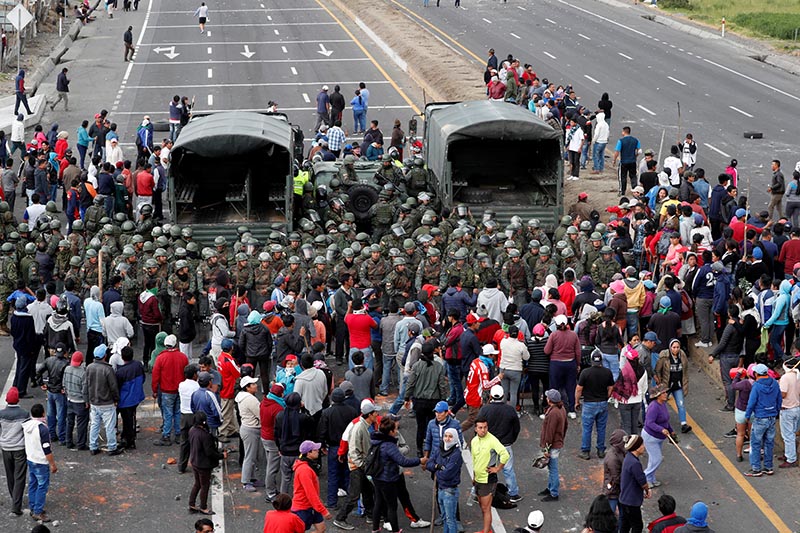Ecuador arrests shopkeepers, man dies as protests rage
QUITO: Ecuadorean authorities began arresting shopkeepers for raising food prices as indigenous groups clashed with security forces on Sunday in a fourth day of protests against President Lenin Moreno's austerity measures.
One man died in central Azuay province when roadblocks blocked an ambulance from reaching him after he was hit by a car, authorities said. Local media identified him as a protester, but that could not be confirmed.
Ecuadoreans complain consumer prices have risen sharply as a knock-on effect of Moreno's abolition of fuel subsidies, which has also triggered the nation's worst unrest in more than a decade.
"Everyone's raising prices with the excuse of the gasoline price rise," disgruntled pensioner Camilo Salazar, 65, said at a food market in the coastal city of Guayaquil, where prices have risen by up to a third in just a few days.
The government said 20 people were detained over the weekend for over-charging for products including corn, onions, carrots and potatoes, which are all subject to price controls.
"There is no justification for raising the prices," Interior Minister Maria Romo said in a statement.
Ecuador's dollarized economy had inflation of just 0.27 percent in 2018.
After a two-day strike by transport unions, indigenous groups have taken the lead in demonstrations against Moreno's economic measures. They barricaded roads in various places again on Sunday with burning tires, branches and rocks.
Some protesters threw stones at security forces, who responded with tear gas. The CONAIE umbrella indigenous group published a video showing spear-wielding inhabitants blocking a road and shouting "Down with the government!"
The 66-year-old Moreno won the 2017 election and has set the oil-producing nation on a centrist track after years of socialist rule under predecessor Rafael Correa.
STATE OF EMERGENCY
Moreno has declared a two-month state of emergency.
Though he enjoys the support of businessmen and the military, Moreno's popularity has sunk to under 30% - compared with 70% after his election - and Ecuador has a volatile history.
Indigenous-led protests toppled three presidents in the decade before Correa took power in 2007. Witnesses said that in Lasso, south of the capital Quito, indigenous groups captured and took away several soldiers after violent confrontations.
Struggling with a large foreign debt and fiscal deficit, Quito this year reached a $4.2 billion loan deal with the International Monetary Fund that requires belt-tightening economic reforms.
As well as ending fuel subsidies, the government is reducing the state work force and planning some privatizations. Moreno says the fuel subsidies, in place for four decades, had distorted the economy and cost $60 billion.
Though transport unions stopped their action after being allowed to raise fares, other sectors have called a national strike for Wednesday.
Moreno, who uses a wheelchair after a 1998 shooting during a robbery that left him paraplegic, has refused to overturn the fuel measure but said the government will increase benefits for the poor to compensate its impact.
Ecuador hopes to save about $1.5 billion a year from ending fuel subsidies. Along with tax reforms, the government would benefit by about $2.27 billion annually.
Correa, who lives in Belgium, calls Moreno, his one-time protégé and vice-president, a "traitor."






